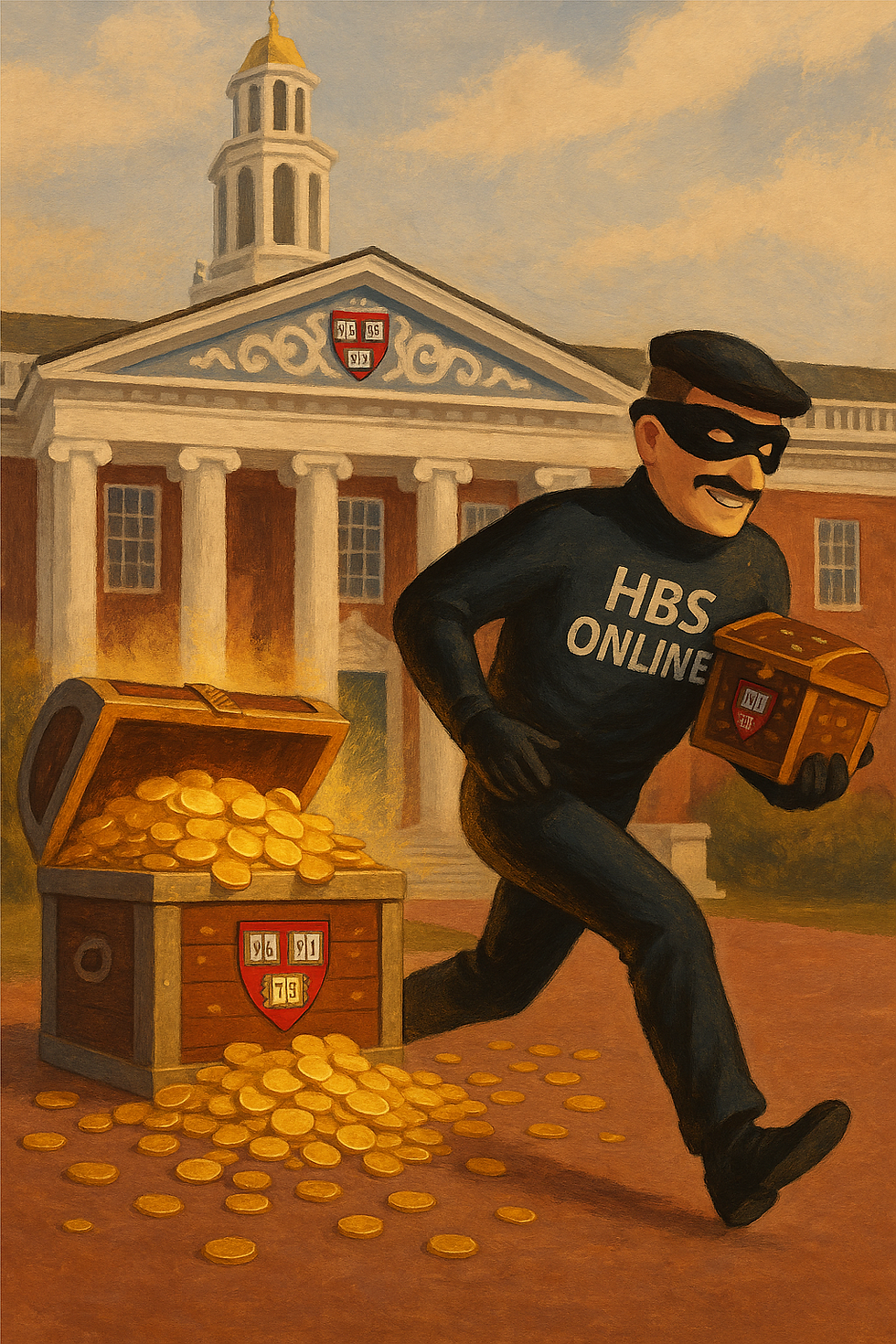The Prestige Paradox of HBS Online
- The Harbus News Staff

- Nov 5, 2025
- 4 min read

A shift from brand stewardship to brand monetization.
Harvard Business School is entrusted with the most valuable asset in global education: its brand. For over a century, that brand has carried extraordinary prestige and served as a durable source of advantage for the institution and its alumni alike.
It confers intellectual rigor, selective admissions, immersive pedagogy, and a formidable network. In recent years, however, HBS has begun extending its reach through digital channels under the banner of democratizing knowledge — most notably via HBS Online.
The expansion aligns neatly with trends in higher education. Yet it raises an uncomfortable question: does widening access inevitably erode the brand? If so, should alumni be concerned?
On a scale of one to five, the level of concern merits a five-plus. The growing emphasis on online credentials signals a subtle but significant pivot from long-term brand stewardship toward short-term monetization. Left unchecked, it risks weakening HBS’s market position and, with it, the enduring value of its credential and community.
The Nature of Brand Equity, Extension, and Dilution
A brand’s equity derives from the associations, expectations, and emotional resonance it evokes. In higher education, elite institutions trade not only on intellectual substance, but also on the signal of exclusivity. That signal commands a lifetime premium for alumni.
Brand extension, however, is treacherous terrain. When extensions conflict with the core brand’s associations, dilution ensues. Loken and John (1993) showed that inconsistent brand extensions erode belief structures; Pullig, Simmons, and Netemeyer (2006) found that overlapping “junior brands” blur the perception of the core.
As Berman (2022) observed, universities face a fundamental tension between democratization and distinction: the more they open the gates, the less their gates matter.
Applied to HBS, the insight is clear: expanding into mass-market, lower-priced credentials risks undermining the very scarcity and selectivity that give the school its power. The brand’s magic lies in its limitations.
Strategic Tension: What HBS Can Do Versus Should Do
HBS unquestionably has the capacity to deliver world-class online programs. Demand for its online educational offerings is strong, and revenues are rising. But capability is not a strategy. The deeper question is not whether HBS can do this, but whether it should.
Consider Hermès, a brand that appreciates restraint as a growth strategy. The company could double production and revenues overnight, but it doesn’t because scarcity is a fundamental attribute of the brand. While revenues would jump immediately, the brand value would crater.
HBS Online presents a similar calculus. Expanding reach may boost revenue in the short term but at the risk of trading enduring brand equity for ephemeral financial gain.
The second risk is institutional distraction: faculty attention, administrative energy, and strategic narrative drawn away from the MBA’s residential core. Over time, the flagship weakens.
The third risk is brand dilution through overextension. When the same crest appears on credentials ranging from $2,000 certificates to $200,000 degrees, stakeholders inevitably conflate them. And while the price differential is logarithmic, perception is not. A $2,000 online credential can easily be mistaken for a $200,000 MBA in the marketplace of impressions.
Proponents might argue that HBS Online fulfills the mission of “making the world a better place” by broadening access. Yet if democratization were truly the goal, the model would look more like MIT OpenCourseWare or Khan Academy: free, open, and mission-driven. Charging thousands for access suggests a sophisticated revenue play cloaked in virtue.
Online Credentials and the Competitive Landscape
The proliferation of online credentials caters to a global appetite for flexible learning. Knowledge, once scarce, is now a commodity. But a high alpha signal remains limited.
In 2020 alone, roughly 40,000 HBS Online credentials were issued compared to 900 MBAs. Acceptance rates hover near 40%, far above the MBA program’s single-digit selectivity. Assuming no growth, HBS Online produces over 200,000 alumni every five years, more than the full-time program has produced in its entire history.
The once-scarce crimson crest is becoming commonplace. A quick scan of LinkedIn confirms these fears: the same digital badge of merit appears proudly on both HBS Online and HBS MBA alumni profiles. When high-status and low-status credentials share a logo, the law of averages applies: the weaker offering drags the stronger one down. Prestige, unlike knowledge, does not scale.
Implications for the HBS MBA Program
The MBA has always been more than a curriculum. It is a lived transformation, an immersive environment, a network, a rite of passage. Its brand premium rests on that experience. The brand remains formidable but fragile.
The existential question looms: if HBS ceases to be primarily a residential MBA institution, what is it? A credentialing platform? A media company? A brand licensing business? Attempting to be everything to everyone often ends with being nothing to no one.
Conclusion
HBS stands at a crossroads. Expanding into online education offers reach and revenue, but each carries a cost: dilution of scarcity, erosion of identity, and the quiet commoditization of prestige.
The lesson from both literature and industry is clear: extend carefully, protect fiercely. Prestige lives in the tension between access and aspiration. HBS must guard that balance with the discipline of Hermès, not the instincts of a growth-stage EdTech firm.
If the school truly seeks to democratize knowledge, the answer is simple — remove the paywall and digital credential. Make learning open; protect the brand.
For a school built on case studies, this may prove to be its most consequential one yet.

The writer of the article has requested to remain anonymous.




Comments